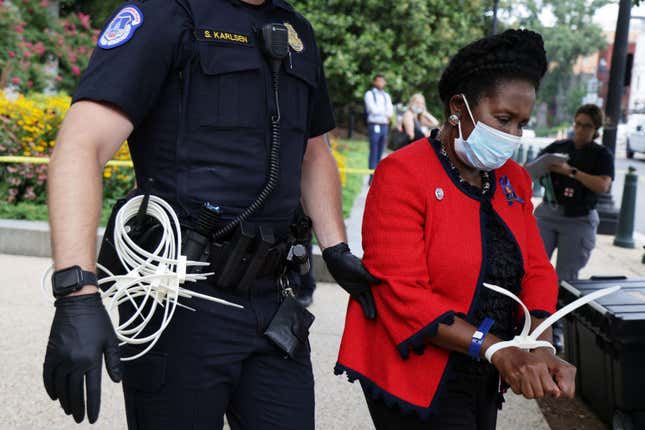
On Thursday, Texas Rep. Sheila Jackson Lee became the third Black House Democrat to be arrested in three weeks for participating in a voting rights demonstration outside of the Hart Senate Building.
“I believe when you are getting into good trouble, when you realize the 15th Amendment has guaranteed the fundamental right to vote, any action that is a peaceful action of civil disobedience is worthy and more to push all of us to do better and to do more,” she said in a video on Twitter.
In another photo shared on Twitter, Jackson Lee’s hands can be shown zip tied together.
“Once again we see a Black woman at the forefront of defending our civil rights and leading the fight to save our fragile democracy,” said Odus Evbagharu, chair of the Harris County Democratic Party, whose district she represents in Congress, in a press release, USA Today reports.
“Congresswoman Lee understands we are at a pivotal moment in the history of our nation, where our sacred right to vote is under grave threat. She recognizes that we all must take action to protect this right.”
USA Today notes that “Reps. Joyce Beatty (D-Oh.) and Hank Johnson (D-Ga.) were also arrested in previous weeks for participating in similar voting rights demonstrations.”
All three House Democrats have been fighting for voting rights for Blacks, while their Republican counterparts have been working steadfastly to keep Black folks from coming to the polls.
From the Guardian:
Texas is already one of the hardest places to vote in the US. Democrats in the state say the proposed laws would make it even harder and further disenfranchise Black and minority voters, by imposing ID requirements on mail-in ballots and banning 24-hour and drive-through voting.
Democrats are working on a revised voting rights bill, after Republicans blocked consideration of a more sweeping proposal last month. The proposed For the People Act failed in an evenly-split Senate along party lines.
Joe Manchin, a moderate Democrat from West Virginia who voted to open debate on the For the People Act despite qualms about some provisions, has offered a scaled-back framework for voting rights legislation. Aspects of his proposal are likely to be incorporated into the Democrats’ revision.

